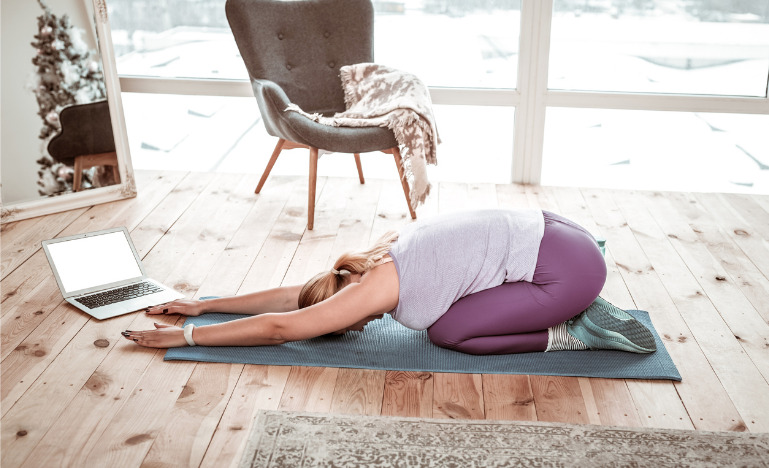Staying sane while shifting to remote work
Some tips on how to be a lawyer, and a feminist, working from home in the age of COVID-19.

As many of us enter our second week of working from home, it bears repeating that these are scary and surreal times. Many Type-A lawyers, like me, thrive on control, routine and predictability. Those touchstones have all gone out the window, as we confront the COVID-19 pandemic and try to adapt to our changed circumstances.
The starting point is that being able to work from home is an incredible privilege. While many are bravely fighting this crisis on the frontlines, the adjustments for a lot of lawyers are far more comfortable and manageable.
That doesn’t make this hiatus easy. To that end, I crowdsourced tips from my network on how to navigate working from home while maintaining mental health, social connections, and (yes) feminism.
How to WFH
- “Nespresso.” – Natalia Bryant, Health Sciences Association of B.C.
- “Time block and take breaks. Have realistic expectations of what you can accomplish, but also set your priorities so you can get the most important things done. Chat with colleagues by phone or LoopUp to remain connected, and share any humorous memes / online content — as well as cute animals — to stay sane and positive.” – Kathleen Leighton, associate, Stewart McKelvey (Halifax)
- “Get up and shower; don’t work in PJs. Also, shut it all down and leave your workspace when you’re done for the day… Videoconferences are way better than conference calls. I’m a big fan of the Zoom meeting platform, which isn’t expensive even for small and solo practitioners (visits from pets during VCs are awesome). And working from home doesn’t mean you have to stop writing client update bulletins, etc. Clients are scrambling for information on a lot of topics right now.” – Laurie Livingstone, partner, Cassels (Calgary)
- “Accept that things are different now – full-time working from home in the middle of a pandemic is not my usual job description. So take it easy on yourself and give yourself time to mentally adjust to the new ‘normal’, because we’re going to be here a while.” – Teagan Markin, lawyer, BLG (Toronto)
- “Puppy coworker (also fresh air and exercise, which both include puppy).” – Meg MacDougall, solicitor, Halifax Regional Municipality
- “At work, I use a white noise app, so doing the same thing at home (even if it’s quiet) helps me to keep a working mindset. My co-clerks and I have been group Skyping to check in with each other, which has been so helpful. Even in a job where we work independently, it’s good to check in with each other.” – Julianne Stevenson, Law Clerk, Nova Scotia Court of Appeal
- “While I’m transitioning to an entirely-remote practice for the time being, I’ve sought out as many tips as possible from colleagues across the country on how to practice efficiently away from the office. I’ve also been bombarding my colleagues with tips and precedents, to assist our more ‘seasoned’ colleagues with navigating remote practice. I’m not sure all my unsolicited advice is appreciated, but they can’t stop me!” – Joe Thorne, Partner, Stewart McKelvey (St. John’s)
Now for my disclaimer: I endorse all of the above, except for one thing: I strongly oppose any suggestion that we should wear our usual work clothes when WFH. To quote feminist writer Jessica Valenti: “I’ll be damned if I’m going to wear anything but elastic waist pants in my own home.”
Maintaining mental health, social connections, and feminist energy
- “Perhaps a primary opportunity of this crisis, demanding that we all retreat and slow down, is a reengagement with our soul through the introverted time that she craves. I’m encouraging clients to embrace all the creative projects and spiritual callings they’ve been avoiding. To me, that’s feminism of the highest order.” – Satya Doyle Byock, depth psychotherapist, Quarterlife.org
- “Regular outdoor time, and check-ins with friends. Supposed to be starting virtual Zoom coffees with pals soon, especially those at home alone or (alone) with kids. Plus outdoor time and bike rides for sure.” – Yuk-Sing Cheng, legal counsel, Metro Vancouver (whose advice was echoed by almost everyone who reached out for this piece)
- “Engage in communication that doesn’t centre around myself or my worries, but instead communication that is community-centred. By this I mean: checking in on loved ones, creating spaces for your community to connect (whether it’s your building/neighbourhood or your professional one), signing petitions to urge governments to make sure vulnerable population like migrants, precarious workers and prisoners are included in the COVID-19 response.” – Rosel Kim, staff lawyer, Women’s Legal Education & Action Fund (LEAF) (Toronto)
- “I’m writing. I’m in physical pain with anxiety but still writing. I’m spending money. I’m checking in with my people. I’m washing my feminist hands.” – Martha Paynter, RN and doctoral candidate, Dalhousie University
- “For my own part, I find myself trying to remember that care work is feminist work. I find myself trying to remember that being productive is an imperative that is often oppressive. I find myself trying to slow down and notice where we are…and let that sink in. I try to remember to take a deep breath.” – Prof. Erin Wunker, Dalhousie University (from the post here)
To add some tips from my own list:
- Practice yoga. (Sweat and spirituality is a healing combination.)
- Watch penguin videos and comforting tv.
- Look for online versions of your regular social activities. So far, I’ve done online church services and a barre class on Instagram Live, and I plan to steal LEAF lawyer Rosel Kim’s idea of hosting a virtual book club.
- Lead or amplify calls to release incarcerated people to prevent the spread of COVID-19 in jails and prisons; to ensure abortion is treated as an essential service; to keep shelters open for survivors of domestic violence; to increase pay for grocery workers. (These demands — many of which are being met — are feminism in action.)
- If you’re on a non-profit board or otherwise involved in community organizations, try to help out with their pandemic response and contingency planning. This kind of productivity feels especially useful, because you are responding to the crisis by taking control of what you can.
- Understand that social distancing and self-isolation are acts of community care — of the most urgent kind.
- And if you’re financially able, consider donating to local organizations that could use extra help right now – food banks are a good option.
Finally, be proud of yourself for getting out of bed.
That means there’s a shred of hope in your heart. Hold on to it.


